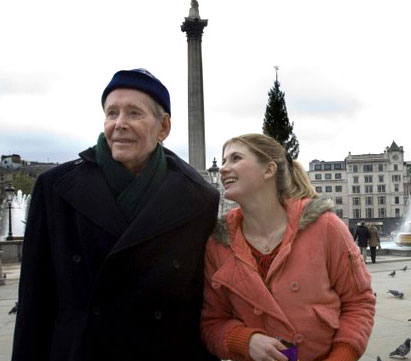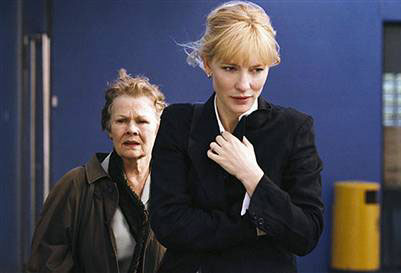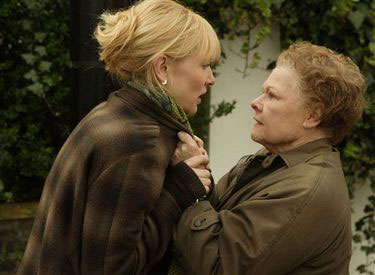|
When I watch a movie, I'm always perplexed when the characters behave in ways that are unbelievable to me. I'm always left wondering, "Is it me, or is it them?" (Or—more to the point—is it my own naiveté, or is it the miscalculations of the director, screenwriter, and actors?) When the film purports to be a serious character study, presenting the dramatis personae as men and women in their most unguarded, truthful moments, I feel doubly at sea.
Roger Michell's Venus, from the screenplay by his frequent collaborator Hanif Kureishi, is an excellent case in point. Michell and Kureishi are old hands at tying audience expectations into granny knots, and most of the time—particularly in the 2003 drama The Mother, starring Anne Reid and Daniel Craig—they create unforgettable films of terrifying, punch-in-the-gut power. Venus distinctly is a lighter work than The Mother, and that may be the problem.
Certainly there's no problem with Venus' main character, Maurice Russell, at least in comprehending him. Maurice (Peter O'Toole), an elderly but still-working actor, has caused untold damage to himself and those around him by a lifetime of boozing and skirt-chasing. However, his randy, life-loving spirit remains indomitable, even as his body fails him. Maurice is so charming, and so essentially decent, that even his much-sinned-against ex-wife (Vanessa Redgrave) still loves and depends on him, even as she gnashes her teeth at the memory of his infidelities.
One day Ian (Leslie Phillips), Maurice's crotchety best friend, tells Maurice of his current problem: his young niece Jessie (Jodie Whittaker) has moved down from the North of England to stay in his London apartment. Ian had hoped that Jessie would be something of a housekeeper and helpmate, but instead she slumps around the flat all day, scarfing junk food and breathing fire at anyone who dares to speak to her. Maurice agrees to speak to Jessie; he does, and something clicks inside his head, if not in hers. The girl stirs him, in the usual ways of course, but also as a sort of reclamation project. She reminds him of Botticelli's painting of Venus arising from the sea, and believes that with a little of the right instruction, she could be a Venus herself. Physically he is no longer able to do much, but he thinks he can open Jessie's eyes to some of life's finer things.

Venus from that point becomes the story of Maurice and Jessie's relationship. The problem is that Jessie is so unremittingly unpleasant—at least until her obligatory, end-of-movie change of heart—that it's hard to root for her, or for the couple. Whittaker is a good actress, and though she's no great beauty, she has an interesting, Vermeer-like face, particularly as photographed in the chiaroscuro lighting favored by cinematographer Haris Zamborloukos. However, Jessie remains whiny, resentful and selfish for most of the film's running time, a kid sister to Mildred in Of Human Bondage, so that her change at the end isn't particularly believable. (To be fair, Maurice also sins against Jessie in some ways, especially when he takes her on a shopping spree he knows he can't pay for.) For this problem, I blame not Whittaker, but Kureishi; Jessie as written is more a foil for Darren, Daniel Craig's brutal, volatile character in The Mother, than for Maurice. (Michell and Kureishi also don't let us forget that Maurice is still a working actor, meaning that he still regularly visits theaters and movie sets where attractive young women who appreciate his talent are in abundance. We can understand he likes the challenge Jessie presents, but why persist when there are easier pickings at hand?)
However, the acting in Venus alone is worth the price of admission, beginning with O'Toole. You'd have to be Mr. Magoo to miss the similarities between Maurice's life and O'Toole's own; that said, O'Toole milks the role of Maurice for every available ounce of humor, subtlety, depth, and pathos. Seventy-four and looking eighty, yet still possessing the magical charm and voice of the star of Lawrence of Arabia, O'Toole once again proves himself an actor of unique and compelling gifts.
The unique and compelling gifts of two other actors—Judi Dench and Cate Blanchett—are excellent reasons, though not the only ones, to see Richard Eyre's Notes on a Scandal. The characters they play are admittedly off-putting, yet not so much so that Dench and Blanchett can't persuade the audience to sit still and watch them. Patrick Marber, who wrote the screenplay for Notes on a Scandal, goes even further than Hanif Kureishi in taking the extremes of human behavior and plunking them down in London drawing rooms. That's precisely what I hated about Closer, Mike Nichols' film of an original Marber play and screenplay. Closer presents four rabidly pathological types playing all sorts of toxic sexual and emotional power games with each other, yet Nichols and Marber insist these people are normal, typical men and women. Even Neil La Bute isn't that brazen. The fine performances of Clive Owen, Natalie Portman, Jude Law, and Julia Roberts in Closer weren't enough to make me want to spend more time with those characters than it would take to spray a can of Raid in their faces. The behavior of the characters in Notes on a Scandal, though every bit as shocking as in Closer, I found much easier to accept, for the simple reason that no attempt is made to present them as normal. Perhaps because Marber is adapting a novel by Zoe Heller rather than writing an original script, the script and the film make no bones about the anomaly of the situation, and therefore the basic, pitiful humanity of the characters comes through much more clearly.

Barbara Covett (Dench) is a history teacher at a North London high school. Nearing retirement age, she lives alone with her cat and has a well-earned reputation as the school disciplinarian. Those disciplinary skills come in especially handy one day in coming to the aid of Sheba Hart (Blanchett), the pretty, talented but scatterbrained new art teacher, when a fight breaks out in Sheba's class. Barbara and Sheba begin a friendship that progresses in the usual fashion until the night of a school event, when Barbara discovers Sheba making love to Steven Connolly (Andrew Simpson), a 15-year-old student.
From that point on, the story becomes a nightmare for Sheba as well as a sad, horrifying portrait of the disintegration of both women's lives. Barbara is shocked by her discovery, but—even more—she perceives it as placing herself in a position of power over Sheba, to insinuate herself more and more into Sheba's life. I know some viewers have criticized Notes on a Scandal as a clichéd, unrealistic and insulting portrait of a lesbian. However, I didn't regard the character of Barbara as a portrait of a lesbian per se, but rather a depiction of one of those lonely, obsessive types—male and female, gay and straight--found more often in life than most of us care to admit. Barbara certainly doesn't care to admit, even to herself, that she has designs on Sheba, or to have any conscious recognition of what those designs might be. What is plain is that she is the most unreliable of narrators. (Heller's novel is told entirely through Barbara's diary, whereas the diary is only one element of Marber's screenplay.) Sitting in half-light in her dingy apartment, caught in the self-made web she didn't even realize she was weaving, Barbara is a classic monster, evoking both pity and terror.

As for Sheba, she quickly finds herself being pulled apart. A naturally impulsive woman from an upper-class family, she lacks any form of will power and has always behaved as if her actions have no consequences, believing her basic good-heartedness will conquer all. Now, she fears discovery by school officials and by her much older husband, Richard (Bill Nighy), who left his first wife to be with her. Meanwhile, Barbara expects Sheba to be at her beck and call, and Steven is far more calculating and manipulative than his winsome façade suggests.
Eyre—whose Stage Beauty was every bit as good as the similarly themed, far more renowned Shakespeare in Love—keeps the film compelling from beginning to end, and he elicits praiseworthy performances from all the actors, giving them all piercing moments of humanity and sympathy. The film's end is appropriately unnerving, and also appropriate as to character, but problematic from a logistical standpoint (I'd have to reveal too much of the plot to say why). The look of the film, with its shabby-genteel townhouses and bleak school yards, is perfect, thanks to the great photographer Chris Menges and the excellent work of production designer Tim Hatley and art directors Hannah Moseley and Grant Armstrong. Notes on a Scandal isn't for the emotionally squeamish, but for those who can take it, it is an unforgettable and unexpectedly moving story of lives gone awry.
|
